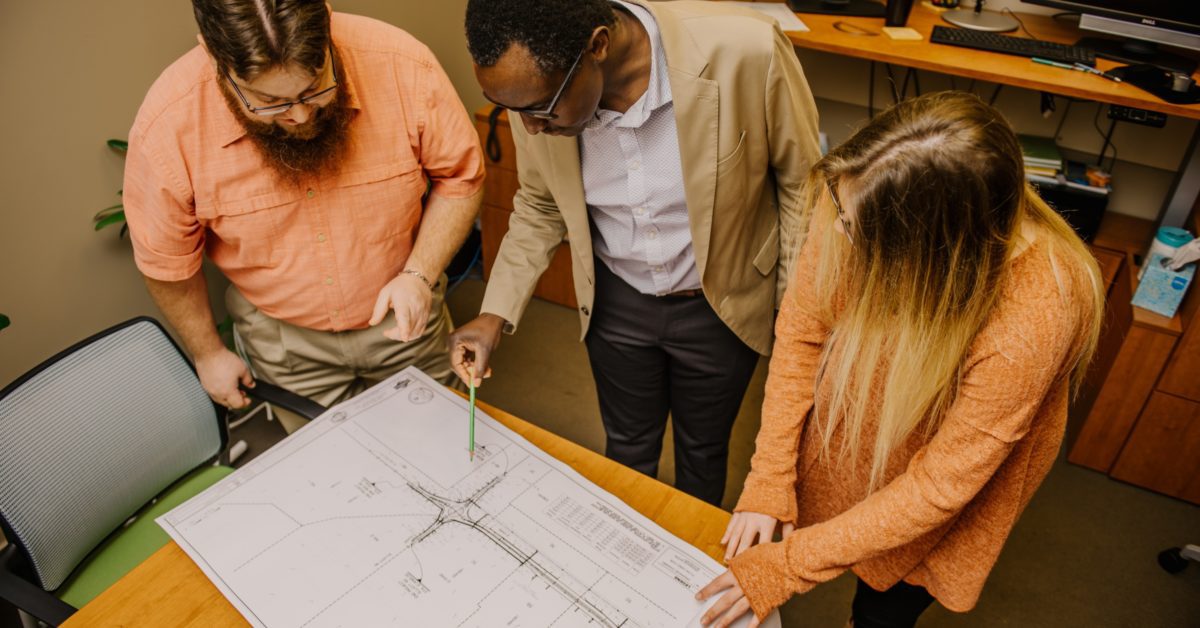Civil engineers are responsible for a whole host of innovations related to modern society and the infrastructure that we depend upon. Whether designing and executing new projects or maintaining and managing old ones, there’s plenty of work available for civil engineers at all levels throughout the profession.
The U.S. Bureau of Labor Statistics reports that demand for civil engineers is expected to grow by about 7% in the next 10 years, a value which is above the average growth rate of 5% for other occupations. The median pay for a civil engineer is $88,000 annually, and this figure is comparable across the globe, with equally high demand and compensation for civil engineers from America to Europe to Asia.
In order to succeed in the field of civil engineering and ensure you’re able to get paid at that competitive rate, there are certain key skills that you’ll need. In this comprehensive guide, we’ll cover the crucial skills that civil engineers need to succeed in the workplace.

via Unsplash
What Skills Does a Civil Engineer Need?
No matter whether you’re a novice civil engineer about to begin your career or a seasoned professional with decades of experience in the workplace, these skills will help you survive and thrive in your career as a civil engineer.
AutoCAD Civil 3D
Having a working knowledge of AutoCAD Civil 3D is the most common hard skill that’s requested when civil engineers are applying for jobs. Understanding AutoCAD Civil 3D is crucial when it comes to showing you’re qualified for a civil engineering role.
A full 11.5% of civil engineering positions list competency in AutoCAD Civil 3D as an essential skill that the candidate that is hired must possess.
AutoCAD Civil 3D is a computer program that enables both architects and engineers to design and plan structural engineering projects.
It’s supported by Building Information Modeling (BIM) and makes it easy to collaborate on projects with your team as well as to predict any potential problems before they happen. It’s the bedrock of software requirements when it comes to civil engineering jobs.
If you do have AutoCAD Civil 3D experience, it’s definitely something that you should highlight on your resume when applying for civil engineering jobs. Ensuring employers know that you have that competency will often set you apart from other candidates with less experience. If you don’t know how to use AutoCAD Civil 3D yet, there’s never been a better time to learn.
Construction Project Experience
Civil engineers must understand the construction process and be familiar with the terminology used in construction projects. That helps them better communicate their designs with the builders and construction crews executing the plans.
When civil engineers have robust experience with construction projects they’re viewed as more well-rounded job candidates. If you do have construction project experience, that is another important feature that you should highlight on your resume.
This is an especially common feature on the resumes of civil engineers who have been in the business for a while. Construction project experience is one thing that newcomers to civil engineering should aim to build in order to get closer to meeting more of the requirements of the civil engineering roles they’re applying for.
Knowledge of Construction Documents
Understanding construction documents can really come in handy in the world of civil engineering. Documents like cost estimates and grading plans are often passed on to civil engineers for assistance, meaning that understanding these documents and learning from construction project experience can help you stand out from other engineers in the field.
Project Management
Unlike some other careers within the engineering and construction industries, civil engineers often see projects through from start to finish. As they work on these projects, they’ll need to manage many clients and work with a variety of different professionals. They’ll also have to stick to a budget and meet the project’s deadlines while still ensuring quality.
Civil engineers have a lot to juggle, which only makes it more important that they have top-notch project management skills. If they don’t, projects can easily get off track, and their reputation (or their company’s) may be harmed in the process. You’ll need to make sure all the moving parts of each project operate smoothly and efficiently in tandem.
Cost Estimates
Civil engineers who have been in the field for a while know that civil engineering can often be a catch-all job that requires a wide range of hard and soft skills in order to excel. Creating accurate cost estimates is one of those skills, and it involves understanding the needs of the projects as well as the pricing offered by different vendors and suppliers.
When you plan and design a project, you’ll normally be sticking to a pretty stringent budget. But when you provide accurate cost estimates for the project to begin with, this shouldn’t be a big issue. You’ll be able to stick to your budget more easily if you make accurate projections about the cost of the project in the first place.
Construction Site Development
Site development refers to the act of preparing a construction site for a project. Oftentimes, civil engineers will be working hard during this stage. They’ll have a number of site development responsibilities, like making plans for parking, draining, and utility lines according to the preexisting conditions at the site.
Executing these tasks correctly often requires actions like analyzing soil and water quality and investigating grade for drainage purposes. Construction crews may also help with the site development process.
They’ll often level, fill, or excavate some of the ground in order to make it safe for building. As any civil engineer knows, you’re very likely to come across a site development in progress at some point during your career.

via Unsplash
Basic Math Skills
Civil engineers have to be well-versed in mathematics in order to solve the complex engineering problems they’re presented with on a daily basis. They frequently have to use mathematical formulas in order to calculate and determine the technical specifications of projects.
While civil engineers don’t spend all of their time using math equations, there are always occasions when they’ll need to be comfortable, quick, and adept at using mathematical concepts and formulas. They’ll need to have a strong grasp of many mathematical concepts to be effective civil engineers.
Algebra, Calculus, Trigonometry, Geometry, and Statistics
All five of these mathematical branches are frequently used by civil engineers. Algebra, the branch of mathematics in which letters and other symbols are used to represent unknown numbers of quantities, is used to solve equations necessary for civil engineering projects.
Calculus helps civil engineers solve problems related to change. It can help solve problems involving changes related to time, heat, electrical current, vibrations, and relationships between different parts of a civil engineering problem.
Trigonometry is the study of the sides and angles of triangles and their relationships to each other. Civil engineers often use trigonometry when completing surveying tasks. Surveying deals with land elevations as well as the various angles involved in certain structures.
Geometry and statistics are also frequently used by engineers to make structures as strong and long-lasting as possible. Infrastructure projects often require a combination of all five types of math in order to ensure quality control, safety, and efficiency.
Written and Oral Communication Skills
When you’re working as a civil engineer, you’ll often have to speak with people from diverse backgrounds across various sectors. That’s why it’s crucial to develop outstanding communication skills, both in writing and orally.
Because civil engineers are frequently required to explain complex technical issues and concepts to people outside of the industry, strong communication skills can really help the average person understand the details of a project. Plus, excellent listening skills can help you grasp the needs and concerns of coworkers or other partners on your projects.
Communication skills fall under the category of “soft skills,” a term that refers to non-technical skills that are typically transferable across industries, jobs, and workplaces. These skills include things like productivity, initiative, creativity, communication, and organization.
Soft skills are in high demand these days, so cultivating yours can help you stand out as an employee, a job candidate, and a civil engineer in general.
Leadership Skills
Many civil engineering projects require working with large and diverse teams. These large teams are good for ensuring the projects conform to the required timeline, budget, and quality expectations, but it can be a challenge to manage big teams that sometimes have conflicting priorities within their ranks.
Leadership is a developed skill that helps ensure all members of a team feel heard, remain motivated, and feel appreciated for their contributions to a project. A good leader will also need to provide feedback and direction in a manner that is both positive and constructive, which can be a difficult line to walk.
So who is on the teams that civil engineers are managing? It depends on the projects, but team members can include architects, contractors, construction managers, suppliers and vendors, other engineers, and trainees.
Of course, you’ll also have to consider the needs of other partners on a project, like owners and investors. Rallying all of these individuals toward a common goal can be a tremendous feat, but with the right leadership skills, it’s possible.
Critical Thinking Skills
Because civil engineering projects are often complex and involve large budgets and comprehensive, long-term plans, there are frequently different solutions at play. You’ll need to be able to determine the optimal solution to solve an engineering problem, meaning you’ll have to be able to weigh the pros and cons of each solution in order to reach a decision.
Critical thinking in the world of civil engineering also involves plenty of problem-solving. You’ll be expected to develop creative solutions to design issues, technical problems, and more. While doing this, you’ll be working within constraints such as time, budget, and safety. There are many factors to juggle when making decisions in a civil engineering role.
Understanding of Physics
Concepts within the realm of physics are often used by civil engineers to apply engineering principles while they’re working on complex projects. Math and science skills are the traits that ultimately set engineers apart from professionals in other industries.
You won’t get the chance to demonstrate soft skills like leadership, adaptability, and critical thinking if you can’t perform the basic technical requirements of your job that involve harnessing your knowledge of math and physics. If you can do both of those things together, however, your success in the field of civil engineering will be set to skyrocket.
Time Management and Deadlines
Civil engineers are no strangers to deadlines. All projects come with an expected timeline, usually with many milestones on the path toward project completion, and these schedules are often of the utmost importance when it comes to civil engineering projects. You’ll need the ability to meet deadlines and work based on a strict schedule.
Time is of the essence with the large projects that civil engineers are constantly tackling. Delays that slow down a project’s time frame can lead to losses of money as well as losses of credibility for the civil engineers involved. That’s why any civil engineer is worth their weight in gold if they have excellent time management skills.

via Unsplash
Teamwork
Being a team player is a job requirement that’s not unique to civil engineering. It’s a critical skill no matter what profession you’re working in, and civil engineering is no different. Especially since civil engineers work on comprehensive, complex projects, teamwork is essential to get things done.
Teamwork and leadership skills often go hand in hand, as it’s essential to ensure that everyone involved in a project is working toward common goals. When everyone’s focus is aligned on the same endgame, the project will be able to run much more successfully, adhering to the budget and the schedule along the way.
Plus, teamwork makes civil engineering so much more rewarding. Developing a strong team culture and a jovial workplace environment can enhance employees’ enjoyment of their jobs. The happier civil engineers are, the more likely they are to do amazing work.
Delegation
There’s rarely a moment in the world of civil engineering during which one person is responsible for an entire project. That’s why civil engineers work with large teams. Their projects are normally big and complex, requiring a concerted effort that’s spread across a big group of people.
But if that big group of people isn’t properly organized and nobody knows exactly what they’re supposed to be doing, the project will be doomed to fail. That’s why civil engineers must have strong delegation skills. It’s a necessity to ensure that everyone on the team is being effectively utilized.
Part of delegation is the ability to assign the right tasks to the right people. You should know and understand the strengths and weaknesses of your teammates so that everyone is working on the thing they’re best at. That way, each person will be able to contribute their highest quality work. When delegation is successful, the project will be successful.
Negotiations
Remember everything we’ve mentioned about sticking to the budget and sticking to the schedule? Unfortunately, that doesn’t always happen. The big projects that civil engineers handle sometimes run into problems—whether they’re related to budget, supplies, or time delays. When these problems crop up, there’s the potential for conflict.
Developing your negotiation skills can help prepare you to handle conflict that arises in the workplace and with regard to the projects you’re working on or managing. Successful negotiation can help resolve conflicts, which potentially prevents delays, keeps costs down, and staves off unnecessary complications that can send a project spiraling.
Budget Management
Civil engineers always work with a budget, and those budgets are often closely monitored. It’s not professional to exceed the budgetary expectations of a project. When you go over budget, clients view that you’re wasting resources as well as money, time, and effort. In order to maintain a strong professional reputation, civil engineers have to have excellent budget management skills.
Computer Skills
As important as soft skills like leadership and communication are, civil engineers depend on their technical skills to succeed in the workplace. It’s essential to be familiar with the computer software programs that civil engineers use and to be confident and comfortable with the technical elements and design factors involved in a project.
Some computer software programs that civil engineers use are AutoCAD Civil 3D, SketchUp, Microsoft Excel, Primavera P6, MicroStation V8i, and others.
Networking
If you want to pursue a long-term career in the field of civil engineering, it’s crucial to connect with other professionals. That can be accomplished by joining engineering organizations and business networking groups, like the ASCE, or the American Society of Civil Engineers.
Final Thoughts
All of these skills make up the diverse set of requirements that comprise civil engineering jobs. Civil engineers take on a huge variety of tasks, and these tasks mandate a combination of hard (technical) skills and soft skills in order to succeed.
When civil engineers are able to combine technical skills like mathematics, physics, use of computer software, and understanding construction projects with soft skills like leadership, creativity, and problem-solving, they’re going to stand out among others in the industry.
In a competitive field like civil engineering, it’s always important to ensure you’re not blending into the background.
If you’re looking to develop a career in civil engineering, learning more about each of these skills is a great place to start. If you’re already a civil engineer with plenty of experience, it can never hurt to refresh yourself on the skills listed in this article. You’ll be able to take on your projects with much more adaptability and enjoyment, too.





